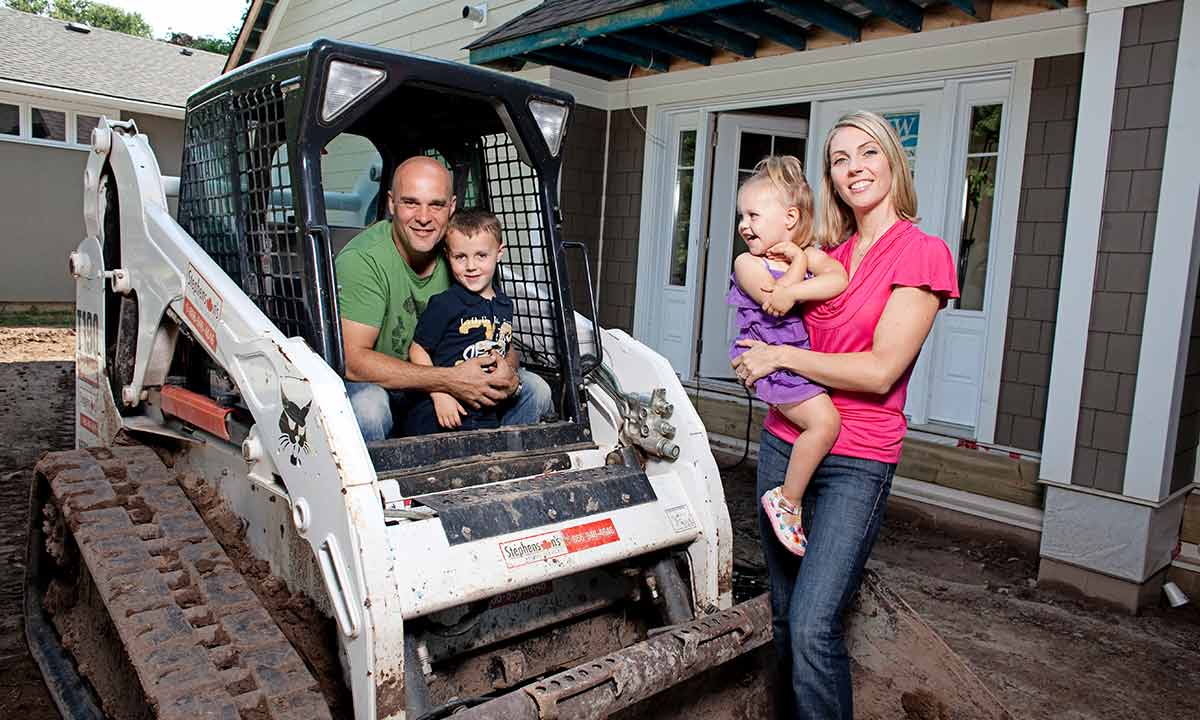HGTV Canada star, Bryan Baeumler, became a business owner when he was only 14 years old. He and some friends opened a business called Moon River Handymen in Georgian Bay, Ontario . They mowed lawns, hauled trash and dug trenches for their neighbours — then eventually progressed to building decks and helping with an addition.
After graduating university — and realizing that despite his political science degree and plans for law school all he really wanted to do was build things — Bryan started again, this time as a dedicated contractor. He focused on building a customer base, finding small projects, and enlisting the help of his wife (Sarah) and mother-in-law to hand out flyers door-to-door.
As with most businesses, success didn’t happen overnight. It took many years and exceptionally long hours for Baeumler Construction to go from a small operation to a thriving business with over 100 employees. Along the way Bryan and Sarah have been open to new business opportunities, which has led to several hit shows on HGTV Canada, and their latest project — an exciting hotel renovation in the Bahamas.
We sat down with Bryan and Sarah who shared the highs and lows of their journey through business startup and growth and hit on some key learnings along the way.
Mistakes are inevitable. Building a business doesn’t happen by doing everything perfectly the first time. That’s not what success looks like. Rather, making mistakes, learning from them, and applying what you’ve learned is what’s going to help you build a healthy business. For our part, we’ve made a couple of big ones. In fact, we hired a General Manager to help us grow, but ended up costing us $1 million worth of mistakes. We learned to hire better and not to duplicate the mistakes that he made!
There will be slow times. The growth of your business doesn’t follow a straight trajectory upwards. Rather, there will be really busy times and some agonizingly slow times. They key is to prepare for the downturns. We have always taken a hit in slow times, but we also always kept our employees — that’s been a priority for us.
Change is constant. When we set out 15 years ago, we had this great plan. But it’s amazing how many forks in the road you come to, how you have to alternate paths. The plan changes as you go — it changes with your children, with your retirement date. The trick is to navigate through the twists and turns with the right people around you.
Cash is king. Cash flow is the most important thing a business needs. There have been times — when in the middle of two spec builds — that we’ve needed a big chunk of cash to finish the jobs. This is a stressful position to be in. We’ve had times when our credit cards have been maxed, our mortgage fully leveraged and we’ve had to go to mom and dad for help. If you can nail your cash flow to avoid these kinds of crunches, you’ll be in good shape.
Need help getting started? If you have your business's financial information, such as monthly expenses and about three minutes, this cash flow forecast template can help you detail the cash coming into and goingout of your business on a monthly basis so you can forecast potential surpluses and shortfalls. Here's how to get started.
Image counts. Image and marketing have always been a big part of our business plan. Keep the trucks clean, keep the site clean, hire skilled and dedicated employees, show up when you say you will, do what you say you’ll do, work hard and pay your taxes. Part of developing a strong image is spending money on the right tactics, too — you have to spend money to make money.
Luck has nothing to do with it. We have been told things like “it must be nice” and “you’re so lucky” when it comes to the success of our business. But the reality is, we put in 19-hour work days for 15 years.
I always say it comes down to fishing and farming. You have to put in your time, keep casting your line, and be ready when the bites come. At the same time, you have to farm. You have to plant your bag of seeds wisely, water them, tend to them. And while you might be hungry for six months, eventually you go outside to a full field of crops. If you don’t put in the time and the effort, you won’t have anything to show for your bag of seeds.
Sacrifices come with the territory. When Sarah owned a dance studio, she was teaching nights and weekends. I was working days. We were working independently and going in very different directions. We determined that if we were going to make our marriage and our family work, we would have to go in the same direction. Something had to give — sacrifices had to be made. That’s when we decided to sell the dance studio and she began focusing on Baeumler Construction. It’s a sacrifice that has paid off, as our business is stronger with both of us dedicated to it and our family spends more time together. But it was a tough decision at the time.
You can only give 100%. You can’t give 110%. Or 120% There is only ever 100% to work with, so prioritizing your day, your week, your year is critical. One day, you might have to say: “Today my wife gets 5%, my son gets 10% and my work has to get 85%.” Accepting the imbalance makes it all work. There are days when we say, “we should probably spend the day together, or spend more time with the kids.” Every day is different and a constant adjustment and reprioritization of the small things is required to make it all work.
Learn more about how Bryan and Sarah got started in business, and how they manage the moving parts of their busy lives.
This article is intended as general information only and is not to be relied upon as constituting legal, financial or other professional advice. A professional advisor should be consulted regarding your specific situation. Information presented is believed to be factual and up-to-date but we do not guarantee its accuracy and it should not be regarded as a complete analysis of the subjects discussed. All expressions of opinion reflect the judgment of the authors as of the date of publication and are subject to change. No endorsement of any third parties or their advice, opinions, information, products or services is expressly given or implied by Royal Bank of Canada or any of its affiliates.



















